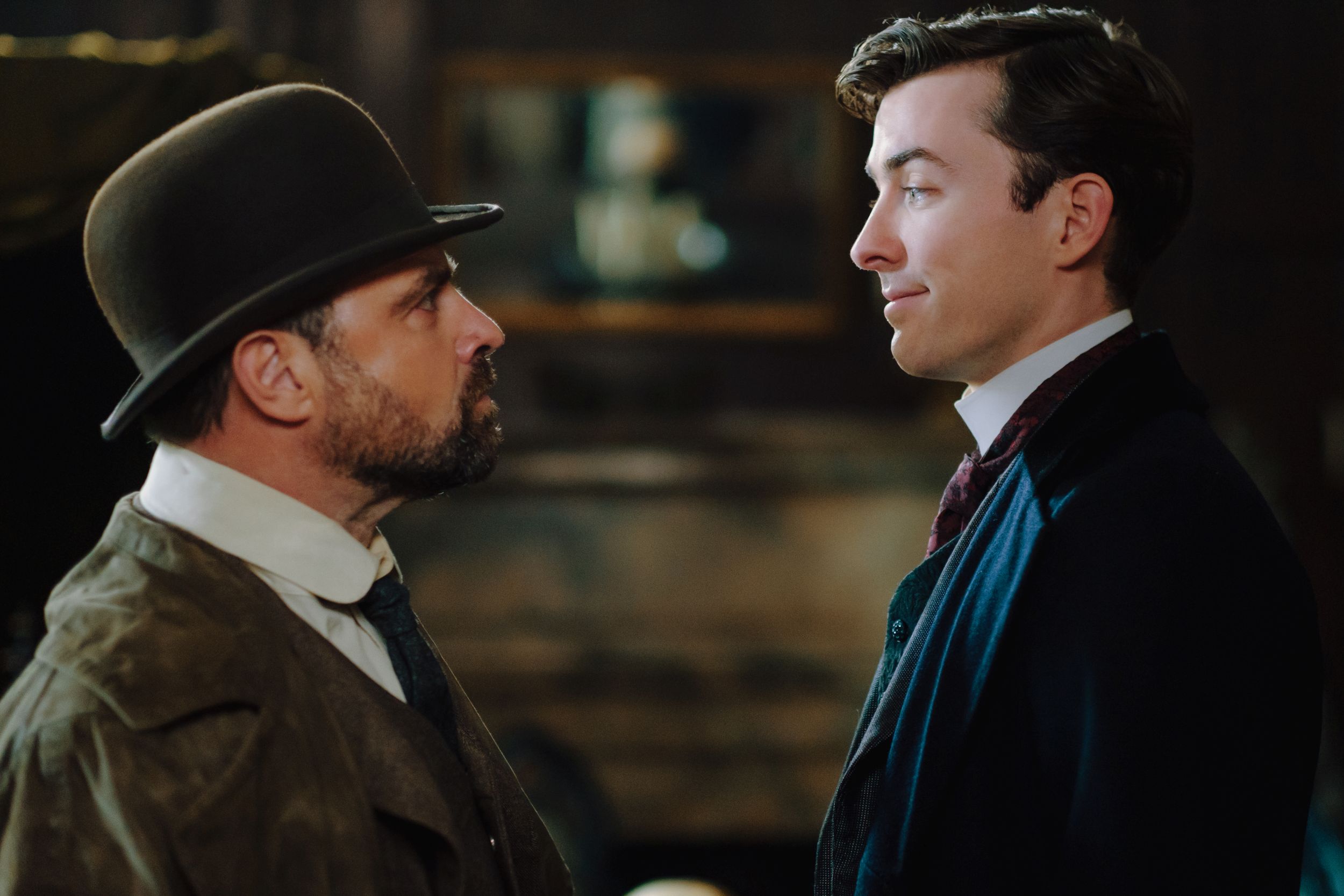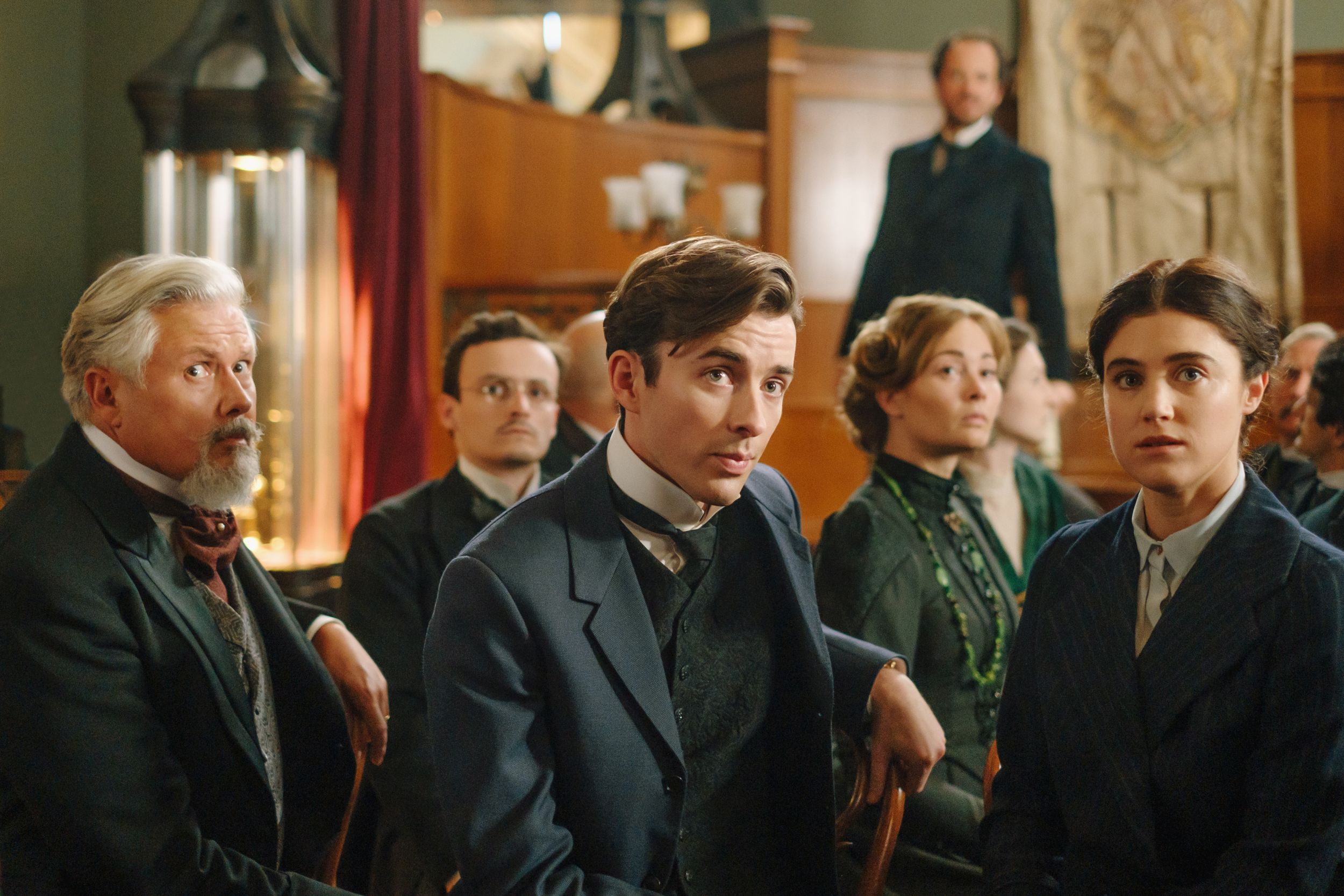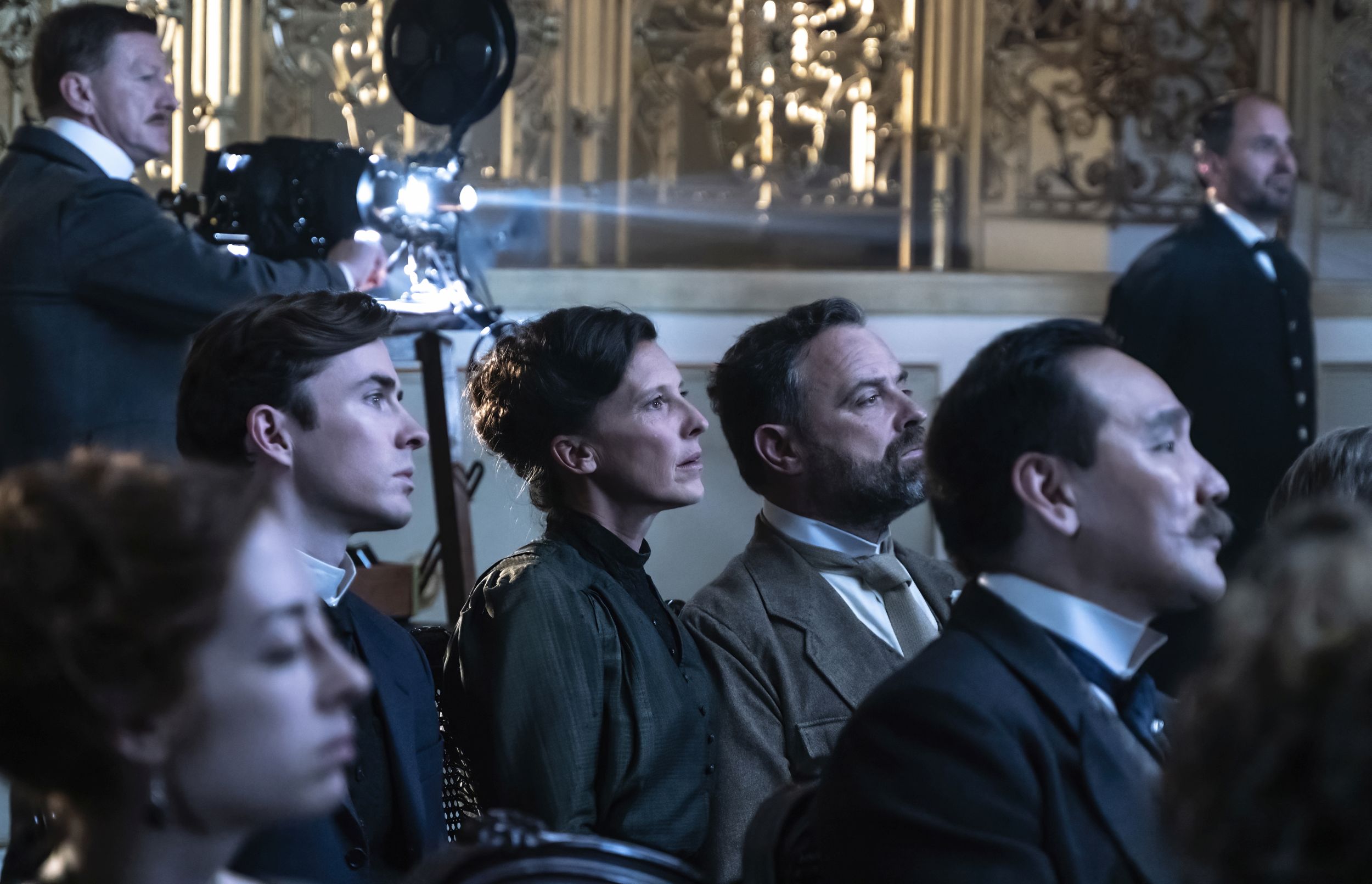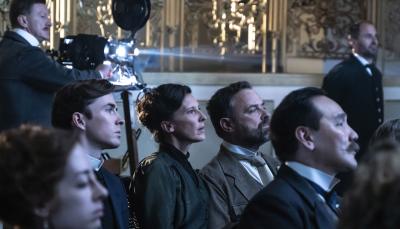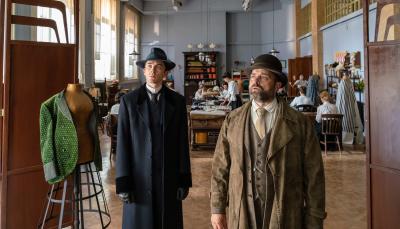Everything to Remember for 'Vienna Blood's Final Season: Welcome (Back) to the Case
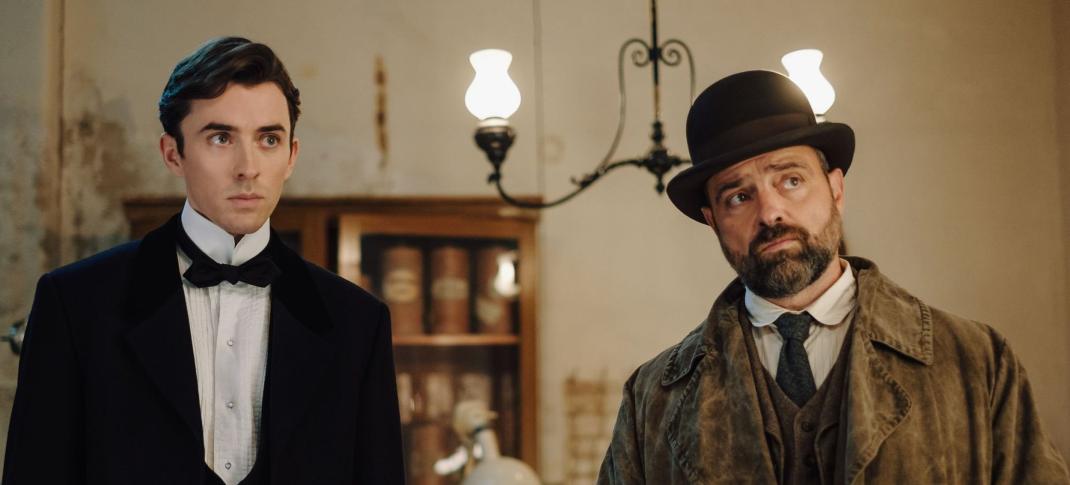
Matthew Beard as Max Liebermann and Juergen Maurer as Oskar Reinhardt in 'Vienna Blood'
Red Arrow Studios International
In anticipation of Vienna Blood’s fourth (and likely final, though I have thoughts about that) season arriving on PBS on January 5, it’s a good moment to revisit highlights of the previous three seasons of this often-delightful odd couple solving murders in the waning days of the Austria-Hungarian Empire. This primer will bring you up to speed if you’ve never watched Matthew Beard (Funny Woman, Magpie Murders) and Juergen Maurer work their particular brand of magic, and will be a refresher for longtime fans who don’t fancy re-reading all of the previous seasons’ recaps.
What’s made Vienna Blood notable? Who’s who, and what do we need to remember about them? What cases have been the most interesting? What moments have been the most illuminating for our characters?
Vienna Blood’s first season opens in 1906 and quickly establishes many of the series’ hallmarks: the rhythms of Dr. Max Liebermann and Inspector Oskar Reinhardt’s contrasting yet complementary investigative styles; the Liebermann family’s dynamics and their just-this-side of precarious status in Vienna as British Jews; and the political intrigue and corruption at the heart of so many of their cases. Max and Oskar are part of a long, appealing lineage of the fictional duo who are unexpectedly and charmingly more than the sum of their parts – Holmes & Watson is the obvious comparison; however, it’s a character pairing that transcends time and genre. Think Cagney & Lacey, Batman & Robin, Jeeves & Wooster, Laverne & Shirley, Frog & Toad – it’s the same classic dynamic across the board because it’s fun to write, to play, and to watch.
Throughout their first three cases together, it turns out the ambitious young doctor from an affluent family and the veteran detective grieving the loss of his daughter have more in common than is immediately apparent. They’re both outsiders in Vienna: Max by his Jewishness, Oskar by his working-class origins and lack of educational pedigree. Oskar is initially gruff with Max, barely allowing him to learn anything about the case he’s been instructed to let Max observe. Max’s unsurprising reflexive response is to protect himself with an off-putting hauteur. They’re off to a less-than-great start, with Oskar asking Max if anyone has “told you how insufferable you are?” and Max instantly replying, “Yes, about a dozen times a day!”
(If that’s not the basis for a lifelong friendship in a detective show, I don’t know what is.)
Once each has accepted the other’s quirks, further similarities emerge. Both men are workaholics who use the demands of their careers to hold them back from forming successful long-term romantic relationships and friendships outside of their casework. Both of them care deeply about and take their cases personally, too; a perennial theme of the show is that Oskar and Max are more effective at solving crimes than most of the other detectives in Vienna, in large part because neither man cares about the political consequences of their findings, prioritizing justice über alles, always.
By the end of the first season, they’re fast friends, having found common ground both at and outside of work, and taken each other’s measure and found him worthy of respect and care. It’s a good thing, too, because by this point, Oskar’s relationship with his wife is definitively over, and the beautiful, wealthy Clara Weiss (Luise von Finckh) has ended her engagement to Max. She deserves time to grow up and to ally herself with a man who will pay attention to her; he deserves to figure out whatever is going on between him and Amelia Lydgate (Jessica de Gouw), the beautiful fellow scientist he treated for PTSD in the season’s first episodes.
Max’s family – the powerhouse trio of Conleth Hill as father Mendel, Amelia Bullmore as mother Rachel, and Charlene McKenna as sister Leah – despair of him romantically while continuing to dote on him. He’s the baby of the family and the only son who is a highly eligible doctor, even if his specialty is distressingly new-fangled. Although the Liebermann family isn’t especially religious, and they’ve made the most of their wealth and class status to assimilate somewhat into Viennese society, their Jewishness leaped out at me through the screen.
I’m used to seeing representations of the mosaic of contemporary Jewish life in American and Israeli TV, but most films and TV shows depicting Jewish life set in the past lean heavily into Fiddler On The Roof-style shtetls or, more commonly, the Holocaust. Vienna Blood’s setting among urbane, well-off Jews prior to the First World War is both unusual and welcome. Crucially, the series gets many of the details right: the melody of Mendel’s blessing over challah at Shabbat dinner is the one I grew up with, and the family’s silence until they’ve taken their first bites of challah rang true, too.
In the first season, Max and Oskar’s adventures include bringing down a maniacal captain of industry (featuring Max’s near-death experience high above Vienna in a Riesenrad carriage), confronting intense Austrian nationalism with a serial killer using The Magic Flute as inspiration, and uncovering sinister hazing rituals perpetrated by an old boys’ club at Max’s nephew’s prestigious Catholic boarding school.
Season 2 brings us to 1907 and more complex cases for Max and Oskar to solve – a murder crossed with two tragic family histories and possible apparitions; political murders and a nearly-successful bombing of peace talks in Luxembourg by Serbian nationalists; and Max going undercover at a monastery. Oskar has hired Miss Lydgate (now played by Lucy Griffiths) freelance to test evidence gathered at crime scenes. Max’s private practice furnishes another routine venue for the pair to meet and discuss casework. The scenes among the Liebermann family are a constant delight, and the addition of the clever and well-informed police precinct archivist Fraulein Linder (Miriam Hie) is very welcome.
Creator-writer Steve Thompson harnesses even more of Maurer and Beard’s fizzy chemistry to consistently winning effect. The season ends with Miss Lydgate seeing Max and Clara kissing and deciding she’s done with this accidental, dithering cad.
Across the course of the season, anti-semitism and nationalism are on the rise, with a vile blood libel-fueled hate crime driving the narrative in the last episode. The crime involves Max professionally and personally (the victim is related to Clara’s new fiancé, a prominent banker), culminating in his infiltrating a monastery under the guise of Brother Maxwell, an English friar on a pilgrimage. Every other member of this order wears one of those hideously unflattering medieval-style tonsures, but Max sports what can only be described as the most boyband-ass coiffure (complimentary) a man in holy orders has ever had.
Vienna Blood’s third season opens in 1908, with Clara choosing herself and becoming quite an intrepid reporter. This pivot was based on the real-life Jewish Austrian reporter Alice Schreck, who became Austria-Hungary’s first war correspondent when the Great War broke out in 1914. Max’s career continues progressing nicely as he publishes his first book to wide success, has a flourishing private practice, and has moved out of the Liebermann family home. There’s not enough time spent with Max’s family this season, except for Leah, who continues to roast her baby brother with glee and affection.
These episodes depict the first actual, sustained conflict between Oskar and Max. Oskar becomes disgusted by Max’s near-giddiness at the most ghoulish aspects of the crimes they investigate. Case highlights included murders at an avant-garde fashion house, the systematic killings of soldiers who served in China during the Boxer Rebellion, tying into an opium den, and Vienna’s burgeoning film industry.
The last of these, “Death Is Now A Welcome Guest,” sets the stage for Season Four by using the murder of a silent film star to learn more about Austria-Hungary’s domestic intelligence apparatus (the agency led by former Police Commissioner Strasser), which will feature prominently in Season 4.
Vienna Blood Season 4 will debut on most PBS stations, the PBS app, and the PBS Masterpiece Prime Video Channel at 10 p.m. ET on Sunday, January 5, 2024, one week before the Season 5 premieres of Miss Scarlet and All Creatures. Starting on premiere day, all four episodes will be available for members to watch as a binge (or as initially intended, i.e., two two-hour-long episodes) on PBS Passport. As always, check your local listings and streamers.

